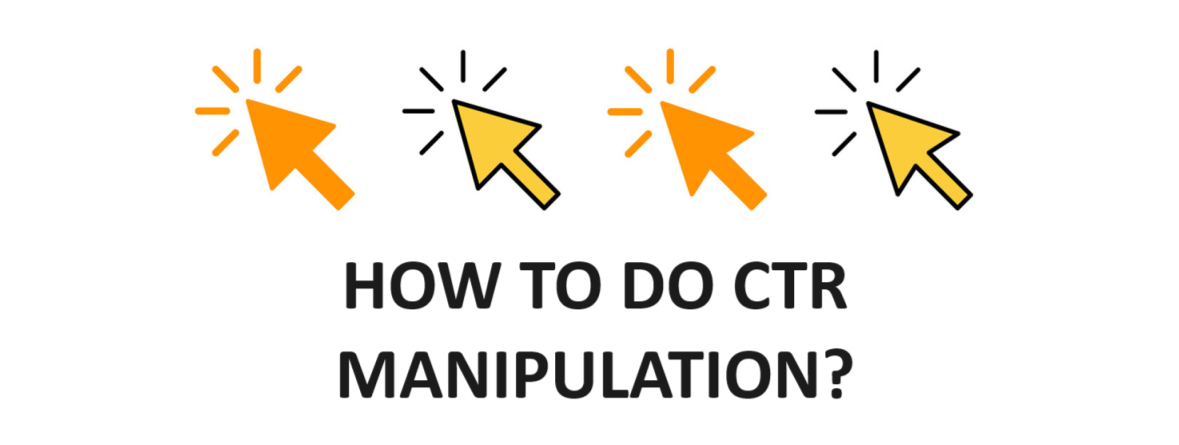CTR Manipulation Strategies: Proven Techniques for Greater Involvement
CTR Manipulation Strategies: Proven Techniques for Greater Involvement
Blog Article
Discovering the Relationship In Between CTR Control Solutions and Individual Habits
In the world of digital marketing, the impact of click-through rate (CTR) manipulation services on customer habits continues to be a complex and intriguing topic. As on the internet platforms significantly rely upon CTR metrics to determine the success of content, items, and solutions, understanding exactly how these controlled prices effect customer engagement and decision-making processes is vital. The interaction in between CTR manipulation and customer behavior questions about authenticity, reliability, and the ethical ramifications of such techniques. By studying the detailed partnership in between CTR control services and user behavior, fascinating insights emerge that might reshape our understanding of digital advertising and marketing techniques and their effects on consumers.
Impact of CTR Control on Actions
Evaluating the influence of Click-Through Price (CTR) control on individual behavior reveals critical insights into the dynamics of online engagement. CTR manipulation entails synthetically pumping up the number of clicks on a specific web link or ad to trick individuals and online search engine. This technique can lead to a distorted understanding of a webpage's popularity or relevance, inevitably impacting individual habits.

In addition, CTR manipulation can alter the information utilized by formulas to personalize individual experiences. This can result in users being served material that does not line up with their choices or passions, eventually bring about a decline in user complete satisfaction and engagement. Understanding the influence of CTR control on customer behavior is vital for keeping openness and count on online communications.
Customer Interaction With Controlled CTR
User engagement with manipulated CTR data usually leads to skewed perceptions of online web content popularity and significance. When individuals engage with content based upon artificially inflated Click-Through Rates (CTR), they may believe that specific details, items, or solutions are much more prominent or reliable than they in fact are. This can lead to users choosing based upon misleading data, resulting in potentially negative end results.
Involvement metrics like sort, shares, comments, and time spent on a website are usually influenced by CTR adjustment. Individuals may be more inclined to involve with web content that shows up to have higher engagement prices, even more perpetuating the cycle of manipulated understandings. Therefore, web content developers and marketers might prioritize creating material that creates high CTR rather than concentrating on producing truly important and pertinent material.

Emotional Impacts of CTR Control

Additionally, the mental impacts of CTR adjustment can also show up in transformed decision-making procedures. Customers might be more likely to click on material exclusively based on its perceived appeal, instead than its real value or relevance to their requirements. This behavior change can cause a superficial interaction with online web content, where users may overlook high-quality however much less popular offerings for those with synthetically improved CTRs.
In significance, the mental ramifications of CTR control highlight the importance of maintaining openness and check here credibility in on the internet interactions to cultivate genuine customer interaction and depend on.
Ethical Considerations in CTR Adjustment
Considering the honest implications of controling click-through rates (CTR) in online systems is necessary for maintaining stability and trust fund within the electronic environment. CTR manipulation raises issues regarding tricking users, misshaping information analytics, and endangering the credibility of online content. One significant ethical factor to consider is the possible influence on user freedom and decision-making. By unnaturally pumping up CTR, individuals might be misguided into clicking web links or ads they would certainly not have actually chosen otherwise, causing an insincere online experience. CTR manipulation can skew the performance metrics that organizations rely on to make strategic decisions, ultimately affecting market competitors and customer trust fund.
An additional honest facet to ponder is the fairness of controling CTR to gain an unfair benefit over rivals. Participating in such methods not only breaches concepts of justice but additionally weakens the trust fund that individuals position in online systems. It is necessary for companies and digital marketing professionals to maintain honest standards in their methods to make sure transparency, reputation, and long-lasting sustainability in the on the internet setting.
Ramifications for Digital Marketing
CTR adjustment can lead to skewed information analytics, misinforming online marketers into thinking that their campaigns are carrying out far better than they in fact are. When users understand that CTRs have actually been manipulated, it can erode depend on in the brand, leading to long-term unfavorable repercussions for client commitment and brand credibility.
Furthermore, making use of CTR control services can develop an unreasonable competitive landscape, where business that engage in such techniques obtain a fabricated advantage over those that comply with honest marketing criteria. This can suppress technology and imagination in digital advertising, as success becomes even more regarding control tactics than supplying this genuine worth to customers. Eventually, the ramifications of CTR manipulation for electronic marketing extend past short-term gains, impacting the total sustainability and credibility of marketing initiatives in the digital world.
Final Thought
Finally, the connection between CTR manipulation solutions and user behavior is complex and diverse. The impact of CTR control on actions, customer engagement with controlled CTR, emotional impacts, ethical factors to consider, and ramifications for electronic advertising all contribute in shaping this relationship. Comprehending these characteristics is vital for marketing experts and scientists alike in order to browse the ethical ramifications and make the most of the performance of their electronic marketing methods.
Report this page